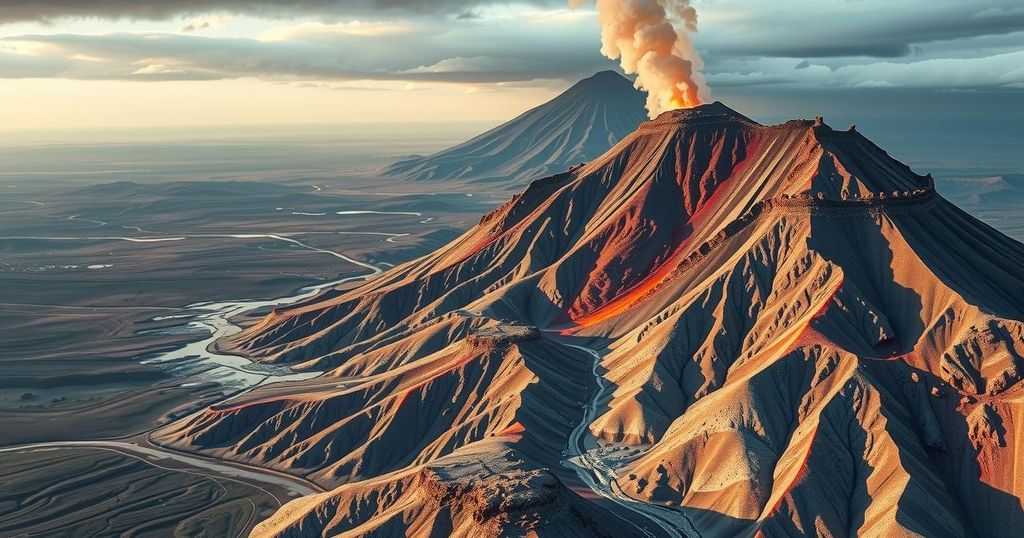World news
ABBAS SHERAQI, ABOMSA, AFRA, AFRICA, AP, BBC, CAIRO UNIVERSITY, CLIMATE, CLIMATE CHANGE, EARTHQUAKES, EGYPT, EGYPTIAN GEO, ETHIOPIA, ETHIOPIA GEOLOGICAL INSTITUTE, ETHIOPIAN GEOLOGICAL INSTITUTE, FENTALE, FLOODING, NATURAL DISASTERS, RENAISSANCE DAM, SHERAQI, US GEOLOGICAL SURVEY, USGS
Sofia Rodriguez
0 Comments
Magnitude-5.8 Earthquake and Volcano Eruption in Ethiopia Prompt Evacuations
On January 4, 2025, a magnitude-5.8 earthquake struck Ethiopia, affecting areas near Addis Ababa. Accompanied by volcanic eruptions from Mount Dofan, authorities evacuated thousands for safety. Geologists warn that seismic activity could intensify, impacting not just Ethiopia but also regional water rights discussions involving Egypt and Sudan regarding the Great Ethiopian Renaissance Dam.
On January 4, 2025, Ethiopia experienced a magnitude-5.8 earthquake that primarily affected the regions around Abomsa and Amhara, located near the capital, Addis Ababa. This seismic event, reported by the United States Geological Survey (USGS) and the Ethiopian Geological Institute, occurred at a depth of 10 kilometers. Experts have predicted potential for escalated tremors based on recent geologic activity, raising concerns for resident safety and stability in the surrounding areas.
In addition to the earthquake, the Mount Dofan volcano in the Afar region erupted. This volcanic activity is accompanied by significant ground fissures, prompting authorities to organize evacuations for thousands of residents to temporary shelters. Geologist Abbas Sheraqi from Cairo University indicated the possibility of intensified seismic fluctuations, suggesting these tremors could be harbingers of further geological instability, potentially impacting nearby volcanic systems such as Fentale, which is situated in a densely populated zone.
Sheraqi expressed his concerns regarding the Great Ethiopian Renaissance Dam (GERD), emphasizing the risks to both Ethiopian citizens and neighboring countries, particularly Sudan. He stated, “We do not wish for the Renaissance Dam to collapse, as our brothers in Ethiopia live safely far from the dam. However, our concern is for our brothers in Sudan, as well as the fact that the waters of the Renaissance Dam serve as an important water reserve for Egypt.” This statement highlights the complex geopolitical ramifications arising from Ethiopia’s continuing progression with the GERD without securing consensus from Egypt and Sudan, who have sought a binding agreement for over a decade.
Attempts at negotiation surrounding the dam have concluded without a resolution, attributed to Ethiopia’s rejection of compromise solutions aimed at protecting the water rights of all parties involved. Egyptian officials have previously indicated dissatisfaction with the negotiation outcomes, which effectively stalled future discussions.
Subsequent to this earthquake and volcanic activity, Ethiopian authorities continue to monitor the situation closely for any signs of further seismic or volcanic developments that could affect the safety and well-being of the local population. Emergency response and evacuation measures remain in place as the situation evolves.
Ethiopia’s geological landscape has long been a region of seismic and volcanic activities, heavily influenced by the tectonic boundaries and fault lines that traverse the area. The Great Ethiopian Renaissance Dam (GERD) has been a focal point of tension among Egypt, Sudan, and Ethiopia for over a decade, stemming from concerns related to water rights and regional stability. Ongoing negotiations have yet to yield satisfactory agreements for upstream and downstream nations, exacerbated by recent geological events that heighten the risk of further ecological threats in the region.
The recent magnitude-5.8 earthquake in Ethiopia, along with the eruption of Mount Dofan, underscores the potential for significant geological disturbances in a region already fraught with geopolitical tensions surrounding the GERD. The affected authorities are responding through evacuations and emergency measures while experts continue to assess the stability of the geological landscape. The pressing need for unified negotiations over the water rights associated with the GERD remains crucial for regional cooperation and safety.
Original Source: www.egypttoday.com




Post Comment